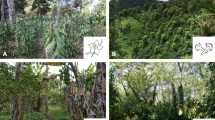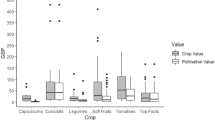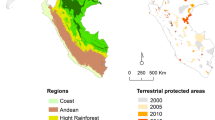Abstract
Forestry activities may be important complements to a farmer’s income within the context of agricultural economics, or autonomous production, with determining factors upon rural dynamics and sustainable development. Taking these ideas into account, the objective of this study was to analyze the importance of forestry for sustainability in Portugal, namely in rural regions, comparatively with the context verified across other countries in the European Union. For this, data from the Eurostat (Several statistics. European Union Statistics, Luxembourg, 2015) for the European countries were used, over the period 1990–2014, and for variables that allowed to capture the interrelationships among forest indicators and economic, social and environmental variables. This statistical information was analyzed from a descriptive perspective and using the pairwise correlation matrix (complemented with the Granger causality Wald tests), through the Stata (Statistics/data analysis. StataCorp, LP, College Station, TX, 2015) software, to understand the relationships between the different indicators. As a main finding, it is worth referring that Portugal has had, in this period, a small impact on the European Union forestry conjuncture, but with great potential, namely in terms of agricultural and rural economic sustainability.
Similar content being viewed by others
References
Barbati, A., Corona, P., & Marchetti, M. (2007). A forest typology for monitoring sustainable forest management: The case of European Forest Types. Plant Biosystems, 141(1), 93–103.
Barreiro, S., & Tomé, M. (2011). SIMPLOT: Simulating the impacts of fire severity on sustainability of eucalyptus forests in Portugal. Ecological Indicators, 11, 36–45.
Bojnec, Š., & Fertő, I. (2014). Forestry industry trade by degree of wood processing in the enlarged European Union countries. Forest Policy and Economics, 40, 31–39.
Branquart, E., Verheyen, K., & Latham, J. (2008). Selection criteria of protected forest areas in Europe: The theory and the real world. Biological Conservation, 141, 2795–2806.
Brunet, J., Felton, A., & Lindbladh, M. (2012). From wooded pasture to timber production—Changes in a European beech (Fagus sylvatica) forest landscape between 1840 and 2010. Scandinavian Journal of Forest Research, 27(3), 245–254.
Carnus, J.-M., Hengeveld, G. M., & Mason, B. (2012). Sustainability impact assessment of forest management alternatives in Europe: An introductory background and framework. Ecology and Society, 17(4), 49.
Carvalho-Ribeiro, S. M., Lovett, A., & O’Riordan, T. (2010). Multifunctional forest management in Northern Portugal: Moving from scenarios to governance for sustainable development. Land Use Policy, 27, 1111–1122.
Cisak, E., Zając, V., Wójcik-Fatla, A., & Dutkiewicz, J. (2012). Risk of tick-borne diseases in various categories of employment among forestry workers in eastern Poland. Annals of Agricultural and Environmental Medicine, 19(3), 469–474.
Dhubháin, Á. N., Fléchard, M.-C., Moloney, R., & O’Connor, D. (2009). Assessing the value of forestry to the Irish economy: An input–output approach. Forest Policy and Economics, 11, 50–55.
Duursma, R. A., Kolari, P., Peramaki, M., Pulkkinen, M., Makela, A., Nikinmaa, E., et al. (2009). Contributions of climate, leaf area index and leaf physiology to variation in gross primary production of six coniferous forests across Europe: A model-based analysis. Tree Physiology, 29, 621–639.
Elbakidze, M., Angelstam, P., Sobolev, N., Degerman, E., Andersson, K., Axelsson, R., et al. (2013). Protected area as an indicator of ecological sustainability? A century of development in Europe’s Boreal forest. Ambio, 42, 201–214.
Eurostat. (2015). Several statistics. Luxembourg: European Union Statistics.
Fares, S., Mugnozza, G. S., Corona, P., & Palahí, M. (2015). Sustainability: Five steps for managing Europe’s forests. Nature, 519(7544), 407–409.
Gurrutxaga, M., Rubio, L., & Saura, S. (2011). Key connectors in protected forest area networks and the impact of highways: A transnational case study from the Cantabrian Range to the Western Alps (SW Europe). Landscape and Urban Planning, 101, 310–320.
Kushida, K., Isaev, A. P., Maximov, T. C., Takao, G., & Fukuda, M. (2007). Remote sensing of upper canopy leaf area index and forest floor vegetation cover as indicators of net primary productivity in a Siberian larch forest. Journal of Geophysical Research, 112, G02003.
Lequy, É., Conil, S., & Turpault, M.-P. (2012). Impacts of Aeolian dust deposition on European forest sustainability: A review. Forest Ecology and Management, 267, 240–252.
Linshan, L., & Yanji, M. (2015). Spatial–temporal pattern evolution of manufacturing geographical agglomeration and influencing factors of old industrial base: a case of Jilin Province, China. Chinese Geographical Science, 25(4), 486–497.
Lousada, J., Noronha, M., Lopes, D., & Silva, M. (2008). Relações entre Peso, Volume e Densidade para a Madeira de Pinheiro Bravo (Pinus pinaster Ait.) Cultivado em Portugal. Silva Lusitana, 16(2), 183–196.
Martinho, V. J. P. (2007). Análise do Crescimento Regional em Portugal com Base nas Teorias da Polarização e da Aglomeração. Tese de Doutoramento. Coimbra: FEUC.
Martinho, V. J. P. D. (2015a). Output impacts of the single payment scheme in Portugal: A regression with spatial effects. Outlook on Agriculture, 44(2), 109–118.
Martinho, V. J. P. D. (Ed.). (2015b). The agricultural economics of the 21st century. Berlin: Springer.
Miklín, J., & Čížek, L. (2014). Erasing a European biodiversity hot-spot: Open woodlands, veteran trees and mature forests succumb to forestry intensification, succession, and logging in a UNESCO Biosphere Reserve. Journal for Nature Conservation, 22(1), 35–41.
Mourão, P. R., & Martinho, V. D. (2014). The choices of the fire: Debating socioeconomic determinants of the fires observed in Portuguese municipalities. Forest Policy and Economics, 43, 29–40.
Nabuurs, G. J., Paivinen, R., & Schanz, H. (2001). Sustainable management regimes for Europe’s forests: A projection with EFISCEN until 2050. Forest Policy and Economics, 3, 155–173.
Paul, K. I., Reeson, A., Polglase, P., Crossman, N., Freudenberger, D., & Hawkins, C. (2013). Economic and employment implications of a carbon market for integrated farm forestry and biodiverse environmental plantings. Land Use Policy, 30, 496–506.
Payn, T., Carnus, J.-M., Freer-Smith, P., Kimberley, M., Kollert, W., Liu, S., et al. (2015). Changes in planted forests and future global implications. Forest Ecology and Management, 352, 57–67.
Repo, A., Bottcher, H., Kindermann, G., & Liski, J. (2015). Sustainability of forest bioenergy in Europe: land-use-related carbon dioxide emissions of forest harvest residues. GCB Bioenergy, 7, 877–887.
Rico, M., & González, A. (2015). Social participation into regional forest planning attending to multifunctional objectives. Forest Policy and Economics, 59, 27–34.
Rocchi, B., Landi, C., Stefani, G., Romano, S., & Cozzi, M. (2015). Escaping the resource curse in regional development: a case study on the allocation of oil royalties. International Journal of Sustainable Development, 18(1/2), 115–138.
Sarmento, E. M., & Dores, V. (2014). Public policies’ support for the forest sector in Portugal. Silva Lusitana, 22(1), 117–134.
Sociedade Portuguesa de Inovação (www.spi.pt) e inno TSD (www.inno-group.com). (2013). Estudo de Avaliação da Estratégia e do Processo de Implementação das Estratégias de Eficiência Coletiva—Tipologia Clusters: Relatório Final. Portugal.
Stata. (2015). Statistics/data analysis. College Station, TX: StataCorp, LP.
Suh, J. (2014). The role of the forestry industry for the success of community forestry: A comparative input–output analysis across India and the Philippines. Southern Forests, 76(1), 29–36.
Upton, V., Dhubháin, Á. N., & Bullock, C. (2015). Are forest attitudes shaped by the extent and characteristics of forests in the local landscape? Society & Natural Resources: An International Journal, 28(6), 641–656.
Valente, S., Coelho, C., Ribeiro, C., & Soares, J. (2013). Forest Intervention Areas (ZIF): A new approach for non-industrial private forest management in Portugal. Silva Lusitana, 21(2), 137–161.
Verkerk, P. J., Levers, C., Kuemmerle, T., Lindner, M., Valbuena, R., Verburg, P. H., & Zudin, S. (2015). Mapping wood production in European forests. Forest Ecology and Management, 357, 228–238.
Vogelpohl, T., & Aggestam, F. (2012). Public policies as institutions for sustainability: Potentials of the concept and findings from assessing sustainability in the European forest-based sector. European Journal of Forest Research, 131, 57–71.
Weiland, S. (2010). Sustainability transitions in transition countries: Forest policy reforms in South-eastern Europe. Environmental Policy and Governance, 20, 397–407.
Acknowledgments
I would like to thank the Portuguese Foundation for Science and Technology (FCT) through the project PEst-OE/CED/UI4016/2014, and the Center for Studies in Education, Technologies and Health (CI&DETS). I would like to thank, also, the anonymous reviewers and the participants of the ICEE 2015 (2nd International Conference on Energy and Environment: “Bringing together Engineering and Economics”), where a preliminary version of this paper was presented, for their suggestions and the anonymous reviewers of the Environment, Development and Sustainability Journal for their comments.
Author information
Authors and Affiliations
Corresponding author
Appendix
Appendix
See Fig. 1, Tables 2, 3, 4, 5, 6, 7, 8, 9, 10, 11, 12, 13, 14 and 15.
Rights and permissions
About this article
Cite this article
Martinho, V.J.P.D. Forestry activity in Portugal within the context of the European Union: a cluster in agricultural economics for sustainable development. Environ Dev Sustain 18, 1339–1397 (2016). https://doi.org/10.1007/s10668-016-9775-x
Received:
Accepted:
Published:
Issue Date:
DOI: https://doi.org/10.1007/s10668-016-9775-x





